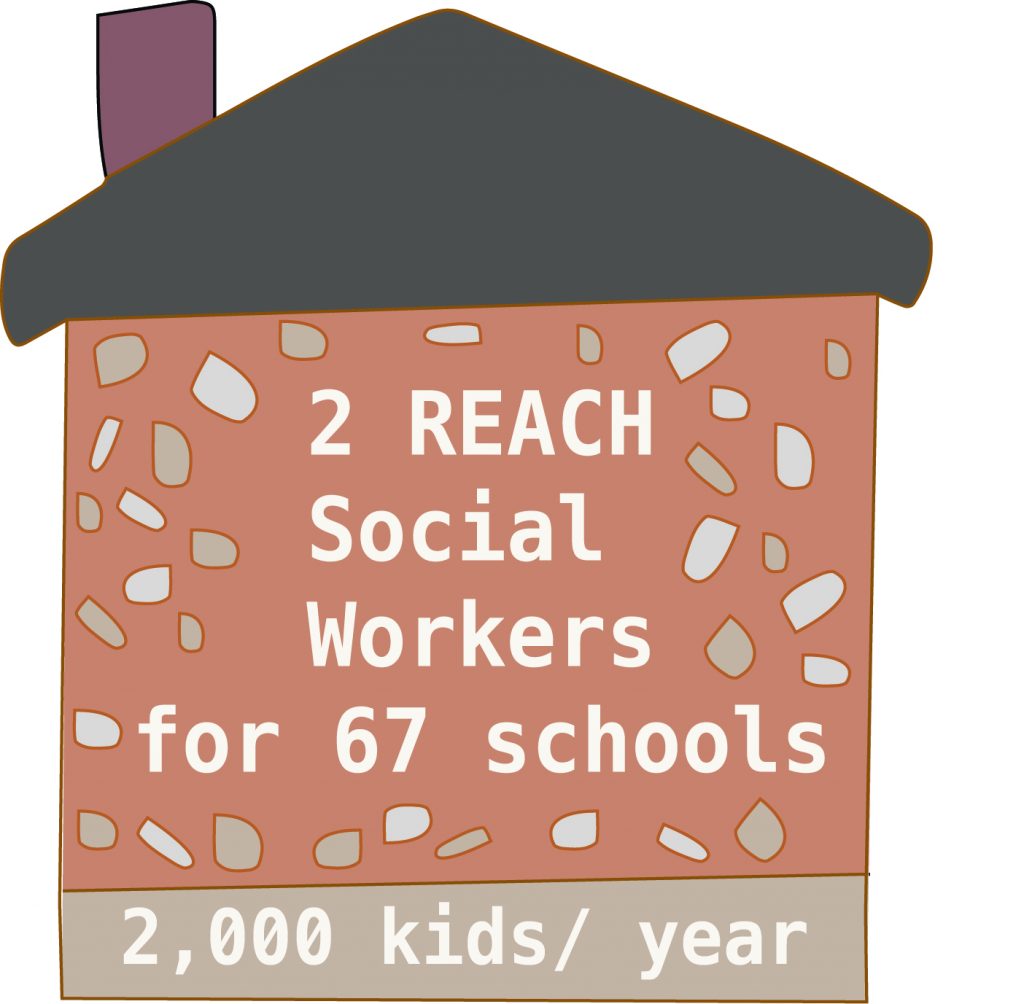With rent on the rise and a 40-day average wait for placement at family shelters, the “most liveable city in America” is struggling to serve its homeless population. In response, two Macalester-Groveland residents have started a petition asking Mayor Melvin Carter III to hold a hearing on what they call the crisis of homelessness in St. Paul – especially in the city’s schools.
The petition, which went live in mid-January, had 490 signatures as of Wednesday night. A plethora of administrators and teachers from across the St. Paul Public School system as well as from various city charter schools have cosigned the document.
Nancy Jane Bitenc, the mother of a St. Paul Public School student and one of the petition’s co-authors, has a vision of uniting the city’s educators to tackle the issue. The hearing would ideally involve advocates and faith communities as well as representatives from both public and charter schools.
Most importantly, however, Bitenc hopes to create space for homeless students and their families to share their stories.
“It is beyond critical that their voices are the loudest,” Bitenc said. “A lot of times these things happen and white middle-class people like me – we have all these ideas and all this energy and all this time to put into this stuff and we talk over them. It was really important to [co-author] Joe [Nathan] and I that we don’t do that.”
“I wouldn’t speak at a hearing like this,” she added. “I would be in the back.”
Bitenc was first turned onto the issue by an MPR report profiling Principal Ryan Vernosh, who has dedicated much of his time to working with the homeless students at his school, Maxfield Elementary in St. Paul’s Rondo neighborhood.
But Maxfield is by no means the only school in the district serving homeless students.
Anne McInerney is a supervisor at Project REACH, an organization that works to identify and serve homeless students in the St. Paul Public Schools. According to McInerney, in any given school year, about 2,000 students in St. Paul report experiencing some period of homelessness.
This poses a challenge for the schools themselves, who are often the first to know when a family loses their access to steady housing.
“Where do these families go when they become homeless?” Bitenc prompted. “They go to their school because their kids are affected immediately.”
At Ramsey Middle School, just one block west of Macalester’s campus, Principal Teresa Vibar is no stranger to the ways in which housing insecurity and homelessness affect some of her students.
“We have students attending Ramsey that are homeless,” Vibar said. “It’s a problem across our whole school district.”
She’s aware of about 10 to 15 students currently experiencing homelessness at Ramsey, though she says not all students come forward when they begin experiencing homelessness and not all alert the school once they’ve found more permanent housing.
It’s a sensitive situation, and Ramsey’s staff have become accustomed to looking for red flags.
For example, teachers regularly take stock of the way students dress and behave in classes as a way of monitoring for students who may be experiencing housing insecurity.
“They’re wearing the same outfit every day, their clothes aren’t clean, they’re tired – often because there are families that double up, kids are sleeping on couches or on the floor,” Vibar said, listing the variety of tell-tale signs Ramsey’s staff keeps their eyes peeled for.
Ramsey administration and staff then react on a case-by-case basis to try and provide some of the necessities a student might be missing. The nurse’s office, for example, maintains a supply of donated clothes and winter wear for students.
“If the student is showing up tired it’s trying to figure out how we can help them get rest,” Vibar said. “School becomes that one consistent place where they get breakfast and lunch and it’s a safe place and we can meet some of their needs that are normally met in the home.”
If a school counselor or staff member confirms that a student is experiencing homelessness, they also contact Project REACH, which serves all 67 of St. Paul’s public schools.
“The school social workers that are from Project REACH office have divided up the district,” McInerney said. “There are two and each of them has half the schools in the district.”
For each social worker, that equates to a caseload of about 700 students per year.
Once connected to a student, Project REACH contacts the family directly to help provide resources and coordinate the search for housing.
But getting families into a shelter can take a month or more, especially if they are staying temporarily with friends or neighbors, as 65 percent of St. Paul’s homeless students are.
“Families living in some place not meant for human habitation – they’re outside, or on a train, or in a car, or in the hospital waiting room – they would have higher priority to get into shelter,” McInerney said. “The priority goes down from there.”
“On average, families are waiting about 40 days, but there are certainly families that get in faster and certainly families that get in [after] a lot longer than that,” she continued.
Bitenc is particularly concerned that the city isn’t spending enough on improving and expanding the resources available to homeless families.
Following the construction of Allianz Field at the corner of Snelling and University last year and the implementation of the Metro Green Line in 2014, she worries the city is mismanaging their budget.
“We are putting up these monuments to wealth, the economy is growing, and the number of homeless families is increasing and the resources are becoming more stressed, more scarce,” Bitenc said.
According to geography professor Daniel Trudeau, however, that interpretation may be misleading.
“One of the issues around the light rail that’s kind of complicated is that while St. Paul has spent money on creating stations, one could argue that the return on investment was enormous,” Trudeau said.
He believes it’s likely not an either-or decision, as infrastructure projects are likely not competing directly with social justice issues for money. Besides that, he noted, funding and legislating initiatives to alleviate homelessness can be an extremely complex undertaking.
“If you think about the causes of homelessness, yes, there is a lack of affordable housing, but it’s not that simple,” he said. “It’s not like if we make more affordable housing then homelessness will go away. There are other issues going on with why people don’t stay in place, or can’t.”
Per Trudeau, legislators would have to consider a diverse range of issues, including providing improved mental health services and advocating for criminal justice reform. Reaching the systemic root of homelessness would surely exceed the resources of any one mayor.
“I think an advocate might both demand that it be on the agenda but also be aware that it’s not up to a single city, however large it is, to change this for good,” Trudeau said.
“If I am a petitioner and I think that by having this on the Mayor’s agenda it’s going to get solved, I’m going to be disappointed,” he continued. “What power do those folks have at city government? The most they can do is ask that resources get committed to a solution.”
For Ward 3 Councilmember Chris Tolbert, the housing crisis is already a top priority. He has worked on several projects to alleviate homelessness in St. Paul – an issue he says is “married” to the accessibility of affordable housing.
“We took a big step on that in our budget this year where… we’ll be investing over $73 million in the next three years into affordable housing,” Tolbert said.
Like Trudeau, however, he acknowledges that the issue isn’t necessarily that simple.
“This doesn’t mean homelessness has been solved, as anyone can see,” Tolbert said. “That’s the hard part, it’s a very complex thing.
“I wish there was a silver bullet but I don’t think anyone has found it in any community across the country,” he continued. “If there were one, we would implement it tomorrow.”












Zoe Mackenzie • Sep 12, 2019 at 7:32 am
Hi there, I found your blog by means of Google whilst looking for a similar topic, your web site came up, it appears great. I’ve bookmarked it in my google bookmarks.
Grace Coleman • Sep 6, 2019 at 4:06 am
This weblog is containing a pleasant information of humorous YouTube movies, I loved it a lot.